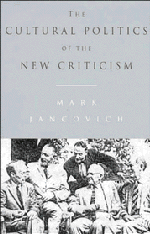Book contents
- Frontmatter
- Contents
- Preface
- List of abbreviations
- Part I The New Criticism and its critics
- Part II The formation of the New Criticism
- Introduction
- 4 John Crowe Ransom: the social relations of aesthetic activity
- 5 Allen Tate: the social organization of literature
- 6 Robert Penn Warren: against propaganda and irresponsibility
- Conclusion: the analysis of a Southern poet
- Part III The establishment of the New Criticism
- Part IV The development of the New Criticism
- Conclusion: Modernism and postmodernism within the American academy
- Conclusion
- Notes
- Bibliography
- Index
6 - Robert Penn Warren: against propaganda and irresponsibility
Published online by Cambridge University Press: 18 December 2009
- Frontmatter
- Contents
- Preface
- List of abbreviations
- Part I The New Criticism and its critics
- Part II The formation of the New Criticism
- Introduction
- 4 John Crowe Ransom: the social relations of aesthetic activity
- 5 Allen Tate: the social organization of literature
- 6 Robert Penn Warren: against propaganda and irresponsibility
- Conclusion: the analysis of a Southern poet
- Part III The establishment of the New Criticism
- Part IV The development of the New Criticism
- Conclusion: Modernism and postmodernism within the American academy
- Conclusion
- Notes
- Bibliography
- Index
Summary
Warren's work on literature up to the mid-1930s differs from that of Ransom and Tate in several ways, the most striking of which is his interest in narrative fiction. Also, while he was not very productive during this period, and while his work lacked the orderly clarification of ideas which distinguished that of Ransom and Tate, he was more flexible intellectually. He tackled areas with which the other two were less willing or less able to deal. This flexibility is partly due to the way in which Warren approached literary criticism. Ransom and Tate were more concerned with the philosophical study of literature in general and used specific writers as instances within more general patterns. Warren, on the other hand, tended to concentrate on the activity of writing as practised by specific writers or schools. His general theoretical positions evolved through a dialogue with specific texts.
Warren's concern with fiction also displayed a more overt interest in the represention of social life, or what might be termed ‘realism’. The significance of this interest is that despite Ransom and Tate's interest in the relation of literature and society, and despite their critique of certain types of cultural organization, they were limited in their attempts to challenge modern society. Through his consideration of realism, Warren was able to define a far more flexible role for the writer. The writer was not limited to a call for the creation of an alternative society and culture, but could also engage in more localized and strategic struggles over social and cultural problems without ignoring the formal aspects of literary activity.
- Type
- Chapter
- Information
- The Cultural Politics of the New Criticism , pp. 55 - 62Publisher: Cambridge University PressPrint publication year: 1993



